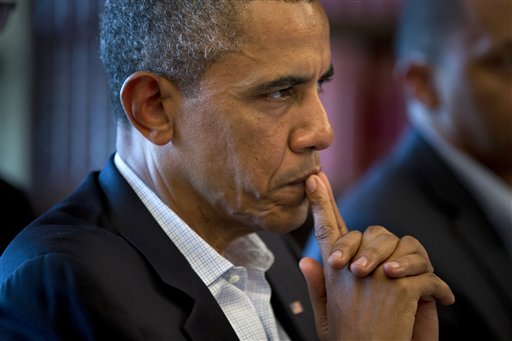By JULIE PACE
AP White House Correspondent
BERLIN
President Barack Obama on Wednesday will renew his call to reduce the world’s nuclear stockpiles, including a proposed one-third reduction in U.S. and Russian arsenals, a senior administration official said.
Obama will make his case during a speech at Berlin’s iconic Brandenburg Gate. His address comes nearly 50 years after John F. Kennedy’s famous Cold War speech in this once-divided city.
The president has previously called for reductions to the stockpiles and is not expected to outline a timeline for this renewed push. But by addressing the issue in a major foreign policy speech, Obama is signaling a desire to rekindle an issue that was a centerpiece of his early first-term national security agenda.
The president discussed non-proliferation with Russian President Vladimir Putin when they met Monday on the sidelines of the Group of 8 summit in Northern Ireland. During Obama’s first term, the U.S. and Russia agreed to limit their stockpiles to 1,550 as part of the New START Treaty.
It’s unclear whether Obama will seek further reductions through a new treaty or a non-binding agreement that would not require congressional ratification. Republicans on Capitol Hill are likely to resist any further cuts to the U.S. stockpiles.
Obama’s calls for cooperation with Moscow come at a time of tension between the U.S. and Russia, which are supporting opposite sides in Syria’s civil war. Russia also remains wary of U.S. missile defense plans in Europe, despite U.S. assurances that the shield is not aimed at Moscow.
Also in Wednesday’s speech, Obama will press Congress to pass a nuclear test ban treaty, seeking to revive an effort that has stalled in recent years.
The official insisted on anonymity in order to preview the issue before the president’s speech.
Nuclear stockpile numbers are closely guarded secrets in most nations that possess them, but private nuclear policy experts say no countries other than the U.S. and Russia are thought to have more than 300. The Federation of American Scientists estimates that France has about 300, China about 240, Britain about 225, and Israel, India and Pakistan roughly 100 each.
___
Follow Julie Pace at http://twitter.com/jpaceDC

COMMENTS
Please let us know if you're having issues with commenting.